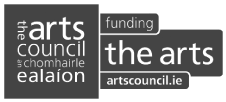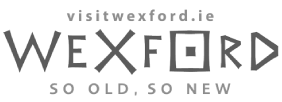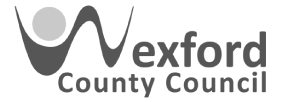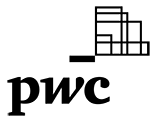From the Mountain
Selected works from the Arts Council Collection and invited artists Orla Bates, Stephen Brandes, Fran Greene, Paul McKinley, Olivia O’Dwyer, and Michael John Whelan.
21 October – 25 November 2019
Venues: Wexford Arts Centre and Wexford County Council
Opening Receptions: Friday 18 October 2019
5pm at Wexford County Council / 7pm at Wexford Arts Centre
With guest speakers:
Ben Mulligan, Head of Visual Arts – The Arts Council
Eamonn Maxwell, Collections Adviser – The Arts Council
Followed by Your Self made Superhuman at Wexford Arts Centre – an experimental, duration performance event curated by Katherine Atkinson.
All welcome, food and refreshments served.
To celebrate its 45th anniversary, Wexford Arts Centre, the oldest regional arts centre in the country, in partnership with Wexford County Council, is delighted to present From the Mountain, featuring works from the Arts Council Collection and invited artists Orla Bates, Stephen Brandes, Fran Greene, Paul McKinley, Olivia O’Dwyer and Michael John Whelan. The exhibition places emphasis on the Arts Council’s continual support in the development of the arts countywide.

From the Mountain considers our relationship with the natural world and how it has changed radically over time. The title of the exhibition is taken from a video work by Michael John Whelan which explores our connection with the environment and questions our diverse roles as observer, protector and eventual consumer. Images of wolves and Irish wolfhounds are placed in the context of historically significant locations in Ireland and Germany, including the site where the last Irish wolf was killed in 1786. Nocturnal shots of rural landscapes interchange with close-up observations of wolves on an arid mountain landscape reserve, where traces of the bare concrete forms of a former cold war missile base can still be seen as it slowly assimilates into the environment. These stark archaeological reminders emerge as lasting visual testaments of the effects of war on the landscape. The work invites contemplation of the methodical extermination of Irish wolves, encouraging a wider reflection on topics such as the ecology, our consumption habits and species extinction.
Many of the works in the exhibition consider moments in socio-cultural history – the definition of equality and freedom, the creation of national states, and the search for secular meaning. The natural world figures in these moments and yet it’s meaning changes through historical context. Paul McKinley’s Lido (2017) is part of a wider series of work titled Elysian Fields, which refers to an afterlife in Greek mythology where the souls of gods and heroes dwell after death. Created from an amalgamation of different places within the Greek landscape, while also suggesting ancient mythologies, the painting aims to capture an essence of place. Although lush and captivating, the subject-matter points to complicated and often suppressed histories. McKinley is drawn to contemporary Greece, a country that, despite experiencing severe economic hardships, has yet maintained a hospitable attitude towards refugees and migrants.
Bound to our perception of the natural world are our social and cultural backgrounds and how these can influence our self-awareness. A number of works refer to the roles we assume or that are ascribed to us. In Aideen Barry’s video Possession (2011), the protagonist reflects the cognitive dissonance of a woman whose fears manifest themselves through her immediate surroundings. Here a housewife responds to her environment, her household belongings and duties, through seemingly irrational and surreal gestures that defy reality and challenge our perception of everyday experiences. Questioning ourselves and our relationship with the environment underlines this work, exploring the borderlands between what is civilized and what is primitive.
Relating to the natural world is one of the richest cultural and aesthetic endeavours. However, no part of the natural world teaches us how to relate to it, how to value it, or how to relate to one another. Works in the exhibition by Alice Maher and Ramon Kassam reference the role of the artist. Ramon Kassam seeks to re-connect with the idea of the artist as a creative subject by incorporating the artist’s work-space, materials, and surroundings with various art histories and biographical elements. Viewed in tandem with work that represents organic form and hints at the way nature changes across forms and species, as referenced by Kathy Prendergast and Gerda Fromel, it may be the case that when considering our relationship to our environment and climate change, we need to become different people. Through creative thinking and our ability to change, as evidenced in the natural world, this perhaps isn’t such a wildly Utopian thought.
The Arts Council Collection was established in 1962 and is one of the most important National Collections in the Country. All of the pieces were collected while the artists were still working. It is not therefore a Museum Collection where works are collected retrospectively. The Collection tells the story of modern Irish art as it developed over fifty years making it particularly fascinating. Currently, the full collection consists of over 1,400 works.
From the Mountain will run in Wexford Arts Centre and Wexford County Council until Monday 25th November 2019. For further information on the exhibition please contact Catherine Bowe, Wexford Arts Centre, Cornmarket, Wexford on 053 9123764 or email catherine@wexfordartscentre.ie.
Your Self Made Superhuman is an experimental, durational performance event curated by Katherine Atkinson. This event offers provocations to the public about our future lives through live art, music, and film. Funded by Wexford County Council, it features performances by Deirdre Buggy, Francis Fay, Maria Hughes, Martin McCann, and Simon Quigley.
fromthemountain_exhibitionbrochure.pdf
Download File
Images (left to right):
Ramon Kassam, New Work, 2016, acrylic, inkjet prints, stretcher bar on linen, 213 x 180cm, Arts Council Collection
Stephen Brandes, Bed & Breakfast, 2005, marker, acrylic on canvas, 201 x 282cm, Arts Council Collection
Alice Maher, The Architect, 1996, etching, 66 x 51cm, Arts Council Collection








